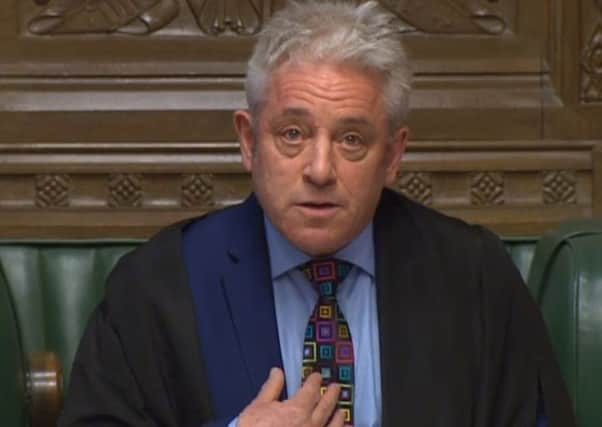Matthew Flinders: Why I respect my friend John Bercow and why the Speaker is not to blame for Brexit bombshell


The Speaker has warned that the Government cannot legitimately submit the same deal for a third vote in Parliament. The Prime Minister had been thought to be on the brink of attempting such a move, hoping to secure more support than in her first two attempts as the Brexit deadline approaches. Bercow says she must make changes to it if she wants to try again.
Advertisement
Hide AdAdvertisement
Hide AdHow dare the diminutive MP for Buckingham interfere with the Government’s carefully calibrated plans? The answer is that he has dared to make this intervention because it reflects his longstanding commitment to put the interests of the legislature above those of the executive. It is this fact – if we are honest – that explains the anger and vitriol that so commonly dominates any mention of “Mr Speaker” on the Government backbenches.


If you want to understand the Bercow bombshell and the anger and accusations of arrogance it has created, then there are some issues to keep in mind.
The first is a need to separate, as far as is possible, the man from the role. Bercow is undoubtedly what might be termed “a character”; he is slightly pompous and – like most MPs – is fond of the sound of his own voice. But the role of the Speaker of the House of Commons demands a strong personality and someone with an equally strong voice. It is simply not a role for a shrinking violet.
Advertisement
Hide AdAdvertisement
Hide AdBercow also inherited a mighty mess when he was elected Speaker (a job he secured largely due to the support of Labour MPs, which still rankles with the Tories).
He took the post in the aftermath of the MPs’ expenses scandal 10 years ago and has dedicated his period in office to not only rebalancing the relationship between the executive and legislature, but also to promoting public engagement with Parliament.
Therefore, not only has the number of emergency questions he has approved drastically increased (much to the chagrin of Ministers) but the Speaker’s apartments (note that they are the Speaker’s apartments and not John Bercow’s) have also been opened up for the use of charities, community groups and civic organisations like never before.
I must at this point make a confession. I know Bercow reasonably well. We’ve worked together on a number of projects during the past decade and my overwhelming sense is of someone trying incredibly hard to do an incredibly difficult job. It is definitely true that I would not want to get stuck in a lift with him but, then again, his impersonations of other political figures are very good and would help pass the time.
Advertisement
Hide AdAdvertisement
Hide AdBut in assessing Bercow as the Speaker, it is vital to understand that it is only the bad news which the media generally covers (for example, the challenges around modernising the governance of the House or – more recently – the cultural climate that has led to accusations of bullying).
The achievements in terms of promoting equality and diversity in internal appointments, the successes in relation to outreach, or even in relation to attempting to make the Palace of Westminster a slightly more tolerable working environment, rarely get a mention.
Seen in this sense, the role of Speaker is really a poisoned chalice – you’re dammed if you do and dammed if you don’t. This is probably why the winning candidate is traditionally dragged to the Speaker’s chair by a gaggle of generally over-excited MPs.
So back to the matter at hand – the Bercow Brexit bombshell. First and foremost, if this was a bomb then it is one that has been ticking for some time. Whispers of the potential intervention of Erskine May (the Commons rulebook) have been flying around the palace for some weeks. On March 13, Labour MP Angela Eagle asked whether it was in order within the rules of the Commons for a motion to be brought back repeatedly.
Advertisement
Hide AdAdvertisement
Hide AdBercow responded: “No answer is required now but a ruling will be made about that matter at the appropriate time. I’m grateful to the right honourable lady for reminding me a ruling might be required.”
With the benefit of hindsight, he might as well have just cast her a mischievous smile and responded “tick, tick, tick…”.
But the only real surprise is that the Government did not see this coming. The missile detection system was obviously down but it would be completely wrong to direct the anger and accusations of arrogance towards Mr Speaker.
Only the Government’s attempts to browbeat Parliament into accepting that it had a choice between a bad deal or no deal can really be defined as arrogance.
Advertisement
Hide AdAdvertisement
Hide AdProfessor Matthew Flinders heads the Sir Bernard Crick Centre for the Public Understanding of Politics at the University of Sheffield. He is also President of the Political Studies Association of the United Kingdom.